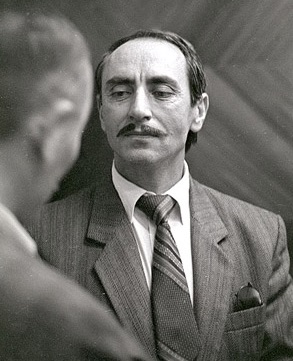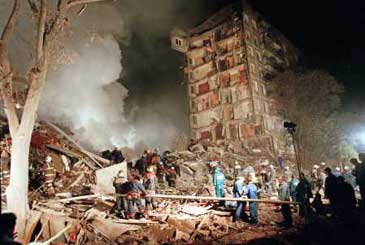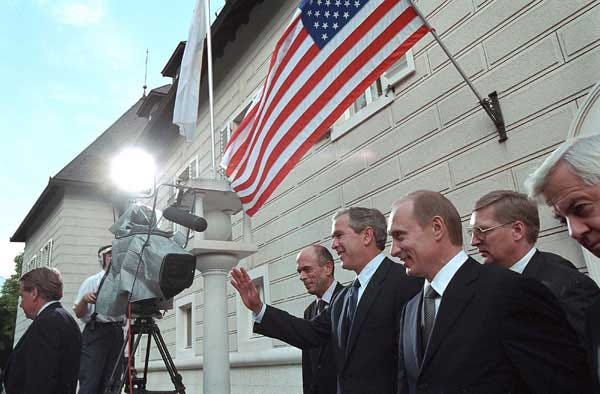Vladimir the Terrible
The uneasy relationship between Putin and terror.
Courtesy of Greg Olear, at PREVAIL, author of Dirty Rubles: An Introduction to Trump/Russia
1/ Operation Successor
During the Yeltsin years in the mid-90s, Russia participated in the First Chechen War, a brutal suppression of the popular uprising in Chechnya. Some 100,000 Chechens were slaughtered by Russian forces. The first president of the Chechen Republic of Ichkeria, Dzhokhar Dudayev, was assassinated—struck by two laser-guided missiles that had honed in on his cellphone location, a technology provided to the FSB by the United States—while he was negotiating peace terms.
 In drumming up U.S. support for the Russians, Bill Clinton compared Boris Yeltsin to Abraham Lincoln*—which would have been a good comparison if Honest Abe was a lush who’d used the Civil War to extract wealth from the country to make himself rich. Dudayev had more in common with Lincoln, while Yeltsin was more of a piece with his own countrymen, be they Soviet or Romanov. His callous disregard for human life was as quintessentially Russian as his rank corruption and his notorious drinking problem.
In drumming up U.S. support for the Russians, Bill Clinton compared Boris Yeltsin to Abraham Lincoln*—which would have been a good comparison if Honest Abe was a lush who’d used the Civil War to extract wealth from the country to make himself rich. Dudayev had more in common with Lincoln, while Yeltsin was more of a piece with his own countrymen, be they Soviet or Romanov. His callous disregard for human life was as quintessentially Russian as his rank corruption and his notorious drinking problem.
From the days of Ivan IV in the late sixteenth century, Russia’s leaders have been extraordinary ruthless about the application of terror to maintain power. The first secret state police, called the oprichnina, was devised by this first tsar, whom history knows as Ivan the Terrible.  Black-clad patrolmen on black mounts descended on towns and villages, like a scene from J.R.R. Tolkien or Washington Irving, leaving death and destruction in their wake. The Okhrana, its spiritual successor, was formed to protect the royal family after unsuccessful attempts to assassinate Alexander II in 1868; it did not prevent the assassination of Alexander III in 1894—or, for that matter, the execution of the last tsar, Nicholas II, in 1918—but it did terrorize generations of Russians, and played a leading role in the Bloody Sunday Massacre of 1905, when peaceful protesters outside the Winter Palace were shot by police.
Black-clad patrolmen on black mounts descended on towns and villages, like a scene from J.R.R. Tolkien or Washington Irving, leaving death and destruction in their wake. The Okhrana, its spiritual successor, was formed to protect the royal family after unsuccessful attempts to assassinate Alexander II in 1868; it did not prevent the assassination of Alexander III in 1894—or, for that matter, the execution of the last tsar, Nicholas II, in 1918—but it did terrorize generations of Russians, and played a leading role in the Bloody Sunday Massacre of 1905, when peaceful protesters outside the Winter Palace were shot by police.
The Soviets, meanwhile, were veritable butchers. Lenin advocated coaxing troops into battle by shooting at them from behind. The Cheka, the state police established in 1917 by Felix Dzerzhinsky, was infinitely more wicked than its antecedents. Stalin was responsible for more loss of life than Hitler, including over five million Soviet citizens who perished in Ukraine and Kazakhstan during the Soviet Famine of 1932-3. Subsequent leaders were less brutal than Stalin, but not exactly Nobel Peace Prize nominees, while the mobsters who now hold sway over that country make Stalin seem calm and measured. In Russia, alas, life is cheap.
Vladimir Putin was still toiling for the mayor’s office in St. Petersburg when Dudayev was assassinated, but his rise to power—remarkable, swift, out of nowhere—began just three months later, when Yeltsin named him Deputy Chief of the Presidential Property Management Department in June 1996. This gave Putin access to the books, and the power to move around money and other assets. He formally joined the Presidential Staff in 1997, ascended to first deputy in May of 1998, and a month later, was named the head of the Federal Security Service (FSB), the successor to the KGB, the organization he’d worked at for most of his career. Putin’s influence over Yeltsin was enormous. Clearly his years with the KGB taught him how to roll drunks.
As the millennium approached, tensions with the Chechens continued, and Yeltsin’s health was deteriorating rapidly. For Putin and the fledgling Russian Federation, the pendulum was swinging the wrong way. But then, on 4, 9, and 13 September 1999, a series of apartment bombings befell the Russian cities of Buinaksk, Moscow, and Volgodonsk, killing 300 and injuring a thousand more. These were reported by Russian media to be the work of Chechen separatist terrorists. But compelling evidence suggests that the terrorist attacks were the work of the FSB, which Putin oversaw until 9 August 1999—just a month before the bombings—when he left to be First Deputy Prime Minister.* Galvanized by his capable response to the attacks, and endorsed by the still-popular Yeltsin, Putin became Acting Prime Minister later that month. He’s been in power, under a variety of titles, ever since.
 The journalist David Satter wrote a book called Darkness at Dawn, laying out the case that the FSB was behind the apartment bombings. He succinctly explained the motive for the inside job during his testimony before the House Committee on Foreign Affairs in 2007:
The journalist David Satter wrote a book called Darkness at Dawn, laying out the case that the FSB was behind the apartment bombings. He succinctly explained the motive for the inside job during his testimony before the House Committee on Foreign Affairs in 2007:
The present ruling oligarchy came to power in Russia accidentally. Were it not for the fact that the Yeltsin leadership was totally corrupt and seized by fear of a grand settling of accounts in 1999, it is highly unlikely that someone like Putin, the head of the secret service with no previous political experience, could have become Yeltsin’s successor. With Yeltsin and his family facing possible criminal prosecution, however, a plan was put into motion to put in place a successor who would guarantee that Yeltsin and his family would be safe from prosecution and the criminal division of property in the country would not be subject to reexamination.
For “Operation Successor” to succeed, however, it was necessary to have a massive provocation. In my view, this provocation was the bombing in September, 1999 of the apartment building bombings in Moscow, Buinaksk, and Volgodonsk. In the aftermath of these attacks, which claimed 300 lives, a new war was launched against Chechnya. Putin, the newly appointed prime minister who was put in charge of that war, achieved overnight popularity. Yeltsin resigned early. Putin was elected president and his first act was to guarantee Yeltsin immunity from prosecution. In the meantime, all talk of reexamining the results of privatization was forgotten.
If true—and I have no reason to believe otherwise—Putin and his cronies were totally chill about indiscriminately exterminating 300 of their own people, and wounding a thousand more, to secure power. The subsequent spate of Russian journalists, suspected double agents, doctors, and dissidents falling out of high windows, or drinking polonium tea, does little to counter Satter’s argument.
Putin is a psychopath. And his ultimate objective, as explained at PREVAIL by Moscow Never Sleeps, has not changed in 21 years: to weaken the West and restore Russia to its former imperial glory.
2/ Bush League
Early in his reign, Putin was keen to remove the Taliban in Afghanistan. The Taliban had put a stop to opium cultivation, which disrupted the heroin business for Semion Mogilevich and the Russian mob, Putin’s allies in his new government. Also, the Taliban was not down with the pipeline project, which the legitimate Russian economy needed. He pressured outgoing president Bill Clinton to move on them in 2000, to no avail.
 In late June 2001, an Indian magazine reported that a joint force was being planned, with Russian, US, and Indian forces combining to oust the Taliban.**
In late June 2001, an Indian magazine reported that a joint force was being planned, with Russian, US, and Indian forces combining to oust the Taliban.**
In July 2001, at the Slovenian Summit where he met face to face with Putin for the first time, new president George W. Bush “looked the man in the eye…found him very straightforward and trustworthy…[and] was able to get a sense of his soul.” I happen to think Bush is savvier than popular reports about him indicate, but even so, Putin manipulating him is like the Viscount de Valmont seducing Cécile de Volanges: “It’s too easy. It is…She’ll be on her back before you’d unwrapped the first bunch of flowers.” A sense of his soul? Really? Putin is a master manipulator, willing and able to convey whatever he wants to convey while never backing down on his commitment to defeating the United States; he showed Bush only what he wanted Bush to see.
A Fox News dispatch from 2002 reported that in August 2001, Putin had warned the Bush government of a plot involving suicidal hijackers planning to attack the U.S.** This was likely a case of Putin spinning the story after the fact, but it’s not beyond the realm of possibility that he had some inkling of what was going down. Our intelligence services heard chatter, after all, which Bush famously ignored.
Putin managed to be the first world leader to call the president after the 9/11 attacks—pledging his total support, of course.*
 On 12 September 2001, a Russian newspaper claimed that Russian intelligence knew who was behind the attacks and who had implemented them, and that Putin had warned Bush a few weeks in advance.** Again, this might have been nothing more than propaganda, portraying the new Russian leader as powerful and in the know, in stark contrast to the reeling Americans.
On 12 September 2001, a Russian newspaper claimed that Russian intelligence knew who was behind the attacks and who had implemented them, and that Putin had warned Bush a few weeks in advance.** Again, this might have been nothing more than propaganda, portraying the new Russian leader as powerful and in the know, in stark contrast to the reeling Americans.
The birthday of Felix Dzerzhinsky—founder of the Cheka, and Putin’s hero—was September 11. This is probably a coincidence, although Russians, like American neo-Nazis, do enjoy this kind of symbolism.
Another Felix, Felix Sater, Donald John Trump’s erstwhile business partner, was a Confidential Informant for the FBI, and a good one: he helped the U.S. government track down Osama bin Laden. How would a guy known for solid Russian mob contacts be able to find UBL, presumably an enemy of the Russians? Further, if the Russians knew where bin Laden was hiding, why did Putin not just relay that intel to Bush or Obama directly, since he was so eager to offer his support? Is there any reality in which Felix Sater knew where bin Laden was holed up, but spymaster extraordinaire Putin did not?
In a 2018 New York Times piece about Bruce Ohr, one of the FBI’s top Russian mob experts, Ohr’s longtime deputy had this to say: “Until 9/11, organized crime was one of the main priority criminal programs at the Justice Department. Russian organized crime was a focus. Bruce knew a lot of the Russia stuff and traveled there.” In other words, 9/11 had the net result of taking the FBI’s focus away from the Russian mob. This means that the primary beneficiary of the worst terrorist attack on US soil was not Osama bin Laden or the forces of “radical Islam,” but rather the despotic leader of the same country that has been our greatest enemy since 1945—as well as his ruthless partners in the criminal underworld. In other words, the guy who came to power by covertly blowing up a few Moscow apartment buildings also benefited enormously when the towers fell.
3/ Trump Card
If Bush was seduced by Vladimir Putin, and Barack Obama insufficiently bellicose toward him, Donald John Trump is, just as Hillary Clinton charged in the debate, Putin’s puppet. Russia has continued to attack the United States, even as Trump has capitulated to Putin, privately and publicly, and run interference on his behalf. The damage done to our institutions is incalculable.
The Russian election fuckery of 2016 continues into 2020, unabated, despite ample warnings from our IC, military, cybersecurity experts, and law enforcement. Trump has done nothing to stop it. Neither have Republicans in Congress, chiefly the traitor Mitch McConnell. Facebook has more or less been weaponized on Trump’s behalf, and the traitor Mark Zuckerberg is uninterested in disarmament. Fox News continues to spew Trumpist propaganda, even in the face of a global pandemic.
In short: We are under attack, still, even as we pretend not to be.
There is more. Russia was likely behind the bizarre attacks on U.S. diplomats in Cuba in 2016-7. Transnational organized crime, meanwhile, has soared like Tesla stock these last three-plus years. It helps Trump’s mobster overlords that the targets of his relentless attacks on members of the FBI and the OSC have one thing in common: they are all experts in organized crime.
What keeps happening is this: Putin and his mafiya partners ply their dark trade, and our president denies reality, and instead of defending the country, goes after…the government officials tasked with keeping us safe from those detestable villains.
Four more years of Trump will end the American experiment. If Trump wins, Putin prevails. Happily, it’s looking like Joe Biden is going to defeat President CAPSLOCK in a rout. But a Biden Administration represents a clear and present danger to Putin’s regime, as well as the mobsters who are his allies and partners. If Trump needs a viable exit strategy, so does Putin.
We must stay vigilant. We must not relent. And we must not panic. Trump and his Russian owners will grow increasingly desperate between now and November. The architect of the Moscow apartment building bombings is unlikely not to go out with a bang.
Research for this piece indicated by the asterisks is from two books: The War on Truth, by Nafeez Mosaddeq Ahmed (*) and The Terror Timeline, by Paul Thompson (**).
Top photo credit: President Bush leaves Brdo Castle with Russian President Vladimir Putin Saturday, June 16, 2001, in Karnj, Slovenia, for a meeting with the press. White House photo by Eric Draper.
Greg Olear is the author of Dirty Rubles: An Introduction to Trump/Russia (2018), as well as two novels. He lives in New York.
For more from Olear, subscribe to his website PREVAIL and follow him on Twitter.
Other pictures, top to bottom:
1. Djohar Dudaev, Ichkeria 1991–1996 president, in 1991. By Dmitry Borko – http://mirror688.graniru.info/Society/History/m.250768.html, CC BY-SA 4.0, Link
2. Crowd facing armed soldiers in Moscow, an event that led to the Revolution of 1905, in Russia. By Unknown (Life time: 1905) – Original publication: Unknown Immediate source: http://chron.eduhmao.ru/page_1_9_0.html, PD-US, Link
3. A picture of one of 1999 Russian apartment bombings. By http://terror99.ru/photo.htm, Fair use, Link
4. Collapse of the towers as seen from across the Hudson River in New Jersey. By Wally Gobetz, CC BY 2.0, Link.
5. “Dzerzhinsky”. Chairman of Vecheka (All-Russian Extraordinary Commission to Combat Counter-revolution and Sabotage)-OGPU (Unified State Political Administration) Felix Dzerzhinsky (1877-1926). By RIA Novosti archive, image #6464 / RIA Novosti / CC-BY-SA 3.0, CC BY-SA 3.0, Link




